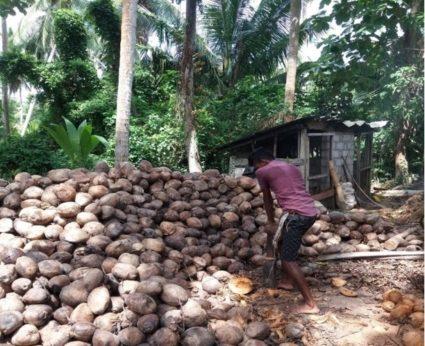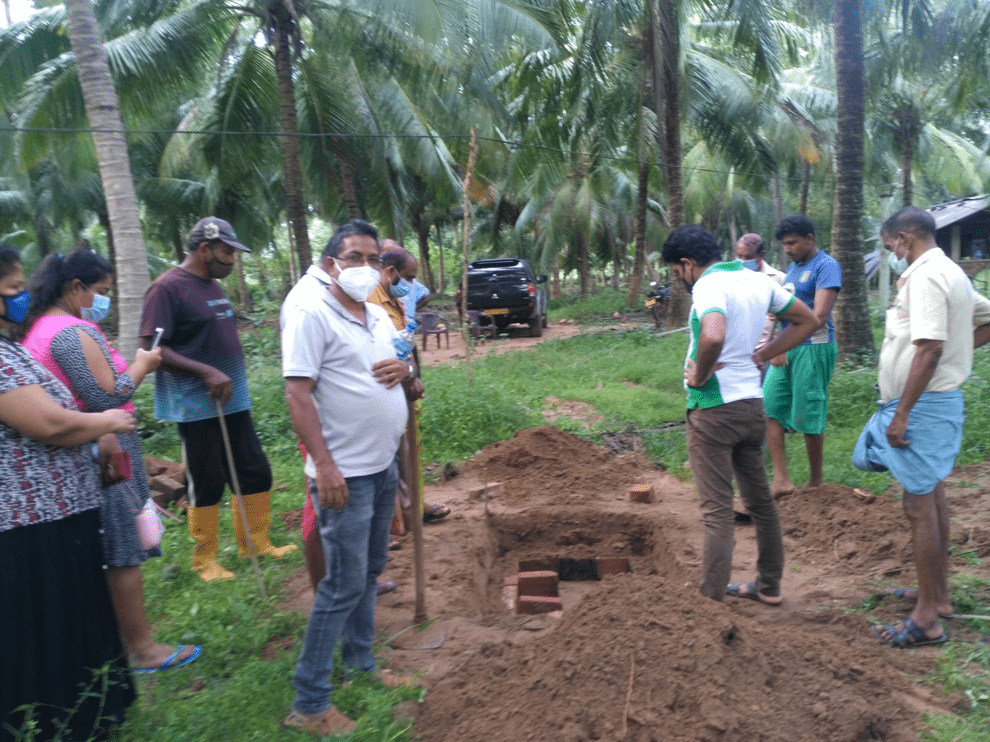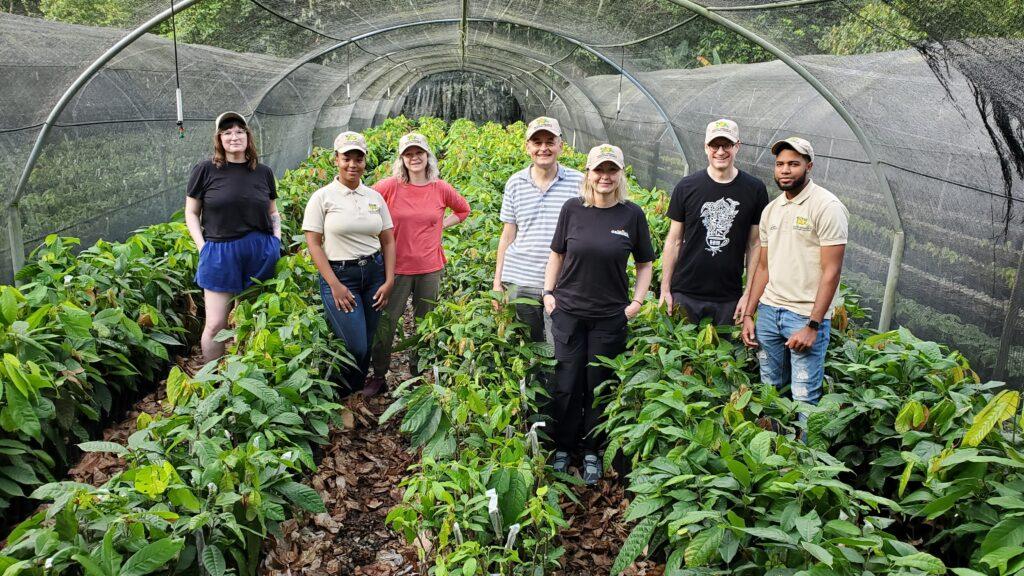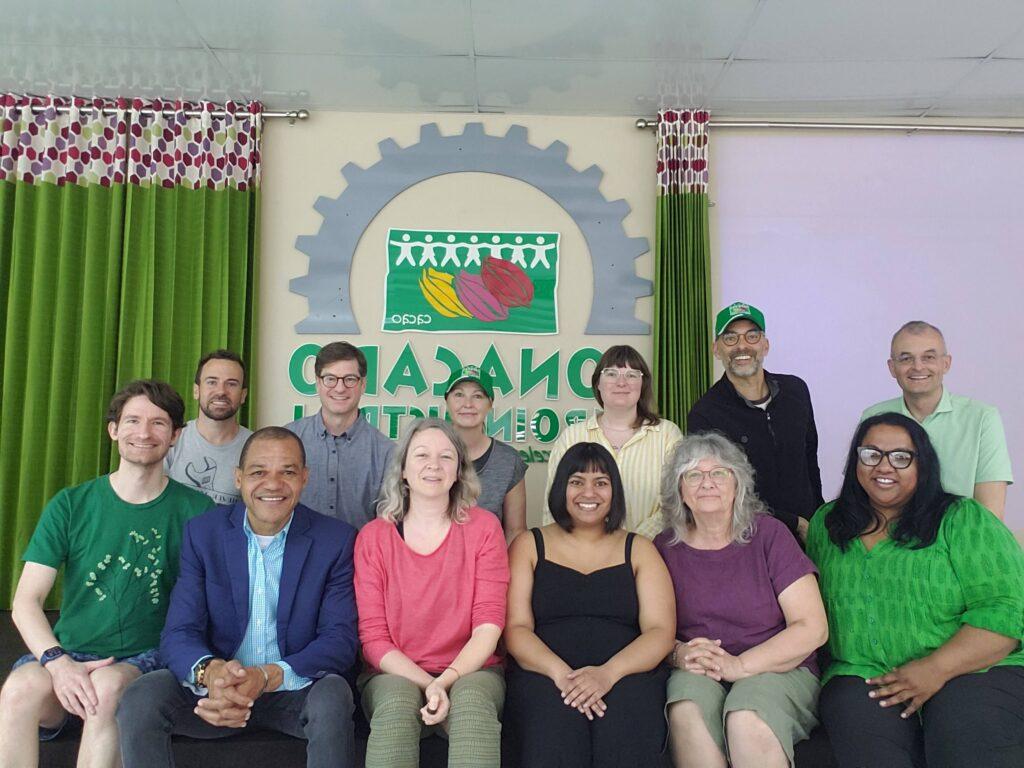Coconut is an important export for Sri Lanka, the island nation south of India. But the past several months there have been tumultuous. Camino coconut is sourced from among 140 fair trade and organic family-owned organic farms in this small nation. Despite the difficulties, various partners who work with our coconut producers expressed their optimism in a recent conversation with Camino.
Excellent Farming Practices

Did you know that Sri Lanka, a country with a population of about 21 million people, is one of the world’s largest coconut exporters? In fact, coconut makes up 12% of Sri Lanka’s agricultural produce[1].
Not only do they grow enormous quantities of coconut, but they are known for the excellent quality of their coconut and coconut products. The vast majority, 80%, of Sri Lankan coconut comes from small-scale farms. These farms have such excellent farming practices that there is very little water and soil pollution [2]. Camino coconut is sourced from among 140 Sri Lankan family-owned organic and fair trade farms.
Economic Crisis in Sri Lanka
However, if you were looking for our coconut this summer, you may have noticed a shortage of that product on store shelves. This uncharacteristic slowdown in supply was due to the worst economic crisis in Sri Lankan history. The causes are many, including the devastating impact of COVID-19.
Since early 2022, Sri Lanka has been facing runaway inflation, chronic shortages of essential goods, such as gas for cooking and fuel for trucks and cars. They have experienced power cuts for hours at a time. Life-saving medicines have been in short supply, even in hospitals and for people who depend on medication to live. Food and transportation costs have increased dramatically.
Overall inflation in Sri Lanka climbed to over 63% as of August 2022[3]. Food inflation is even higher, at nearly 94%, making food so expensive that, according to the United Nations World Food Programme (WFP), 30% of the country does not know where their next meal is coming from. To help feed the hungry crowds, community kitchens are trying to fill some of the void. India and other countries have sent humanitarian aid, but the need is great. The WFP reports that one in four Sri Lankans are skipping meals. Fuel costs have also skyrocketed. As of August 2022, inflation rates for fuel run at nearly 149%. [4]
With tensions running high and lineups sometimes erupting in violence, protests in Sri Lanka led to crowds storming government buildings in July, pushing the president, Gotabaya Rajapaksa, to flee the country. He was replaced by Wickremesinghe, who will complete the former president’s term, ending in 2024. But the troubles are not over yet.
MOPA, More Than Just an Association

According to producer partners from MOPA (Marginalized Organic Producer Association), a democratically organized association for producers in Sri Lanka, the fuel shortage is one of the biggest issues in the current economic crisis. Fuel is issued in limited quantities, insufficient to maintain regular activities, even for farmers. Mr. Lal Ranaweera, Head of Purchasing for raw materials from MOPA producers explains, “In Sri Lanka most coconut farmers sell their produce to a collector in the region who comes to each farm. Most collectors cannot get a sufficient amount of fuel for collecting all the coconuts they usually collect from farmers.” So, the difficulties of getting coconuts to market on time means small scale farmers are having trouble making ends meet. MOPA took action to help ease the crisis for farmers and their communities by distributing staples, such as flour, rice and tea.
Sri Lankan Resilience
Not only have farmers had difficulty in getting the raw materials to processing plants, but power cuts made it difficult to plan production. This has pushed processing plants to seek other energy sources. For example, Bio Foods, where Camino coconut is transformed to shredded coconut, is looking into solar energy for the future.

Dr. A. S. Ranaweera, Chairman of Bio Foods and Founder of MOPA, remains optimistic that things will soon return completely to normal. Clearly, Sri Lankans display resourcefulness and resilience.
Despite the many serious challenges, Sri Lankans have been working very hard all along to keep their supply chain moving. Knowing how dire the foreign currency shortage is in Sri Lanka and how important their export market is for their economy and for MOPA’s farmers, one of the best things we can do here is to keep contributing to their economy by purchasing their delicious, fair trade coconut.
Sources:
[1] Sri Lanka Export Development Board. (2017). Coconut and Coconut-Based Products. https://www.srilankabusiness.com/coconut/about/#:~:text=Coconut%20accounts%20for%20approximately%2012,3600%20million%20nuts%20per%20year.
[2] Sri Lanka Export Development Board. (2022). Why Sri Lanka Coconut and Coconut-Based Products? https://www.srilankabusiness.com/coconut/about/sri-lanka-coconut-advantage.html
[3] Bloomberg, article written by Ondaatjie, A. (2022, August 31). Sri Lanka Inflation Hits 64.3% in August on Costlier Fuel. https://www.bloomberg.com/news/articles/2022-08-31/sri-lanka-inflation-quickens-to-64-3-in-august
[4] Idem


